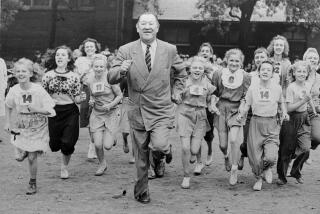Noon Wins $1-Million Jury Award : Jurisprudence: Verdict in favor of former NCAA shotput champion is intended to send USA Track & Field a message about drug testing.
- Share via
Sending a strong message to USA Track & Field, a San Diego Superior Court jury Monday awarded Brent Noon, three-time NCAA shotput champion from the University of Georgia, almost $1 million in a suit over a 1992 drug test.
Noon, 22, claimed that the national governing body for the sport illegally banned him from competition in 1992 when he failed to take the test, violated its own rules and then tried to conceal mistakes by back-dating documents.
Noon said he’d suffered mental distress because the suspension, handed down five weeks before the U.S. Olympic track and field trials, adversely affected his ability to make the 1992 Olympic team.
“Brent did this to stop this kind of conduct (by track officials), to make sure it didn’t happen to any other athletes,” said Terry Singleton, an Escondido attorney representing Noon, who could not be reached for comment.
Pete Cava, USA Track spokesman, said the organization will file an appeal.
“Of course it’s disappointing,” he said from Indianapolis. “But we don’t want to say much.”
Monday’s verdict concludes a two-year battle for Noon, who also had sued Art Venegas, UCLA’s assistant track coach, for defamation.
Noon claimed that Venegas had spread rumors that the shotputter from Fallbrook used anabolic steroids to become California’s all-time best. UCLA and Venegas settled with Noon in July. Terms of the settlement were sealed by Superior Court Judge Richard Haden.
John Campbell, USA Track’s attorney, said the award was about as much as Noon asked in settlement proceedings. Although Noon was awarded $983,000, Campbell said it will be reduced to $740,000.
Still, he said USA Track did nothing wrong beyond making a human error.
“The result does not fit the evidence,” Campbell said.
Jurors said they wanted to send a message to track officials to ensure athletes are handled fairly when undergoing drug testing.
“They ruined his reputation, ruined his name and they were going to pay for it,” Singleton said.
“I understood (the decision) has tremendous ramifications for other athletes who come through the system,” said Eletta Files, a juror from Lakeside, Calif.
Noon claimed he was banned in April of 1992.
The notice was sent to Fallbrook, but the Noons had moved to Athens, where Noon was enrolled at Georgia.
Then a drug-test kit was sent to Georgia’s athletic department with instructions to return it within 48 hours. Noon said he learned of the request a day after the deadline.
Although he claimed not to have known about the test and offered to take it afterward, Noon was banned. His eligibility was restored after five weeks, but Noon said the ordeal affected his training. He finished ninth at the Olympic trials.
Times staff writer Tony Perry contributed to this story.
More to Read
Go beyond the scoreboard
Get the latest on L.A.'s teams in the daily Sports Report newsletter.
You may occasionally receive promotional content from the Los Angeles Times.






